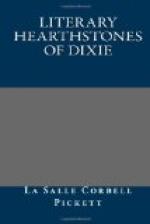To the pines of North Carolina the poet was taken, in the hope that they might give him of their strength. But the wind-song through their swaying branches lulled him to his last earthly sleep. On the 7th of September the narrow stream of his earthly existence broadened and deepened and flowed triumphantly into the great ocean of Eternal Life.
“THE POET OF THE PINES”
PAUL HAMILTON HAYNE
“Why are not your countrymen all poets, surrounded as they are by beautiful things to inspire them?” I asked a young Swiss.
“Because,” he replied, “my people are so accustomed to beauty that it has no influence upon them.”
They had never known anything but beauty: there were no sharp contrasts to clash, flint-like, and strike out sparks of divine fire.
Had the beauty of old Charleston produced the same negative effect, Southern literature would have suffered a distinct loss—if that may be regarded as lost which has never been possessed. For centuries the Queen of the Sea stood in a vision of splendor, the tumultuous waves of the Atlantic dashing at her feet, eternal sunshine crowning her royal brow. Her gardens were stately with oleanders and pomegranates, brilliant with jonquils and hyacinths, myrtle and gardenia. Roses of the olden time, Lancaster and York and the sweet pink cinnamon, breathed the fragrance of days long past. The hills that environed her were snowy with Cherokee roses and odorous with jasmine and honeysuckle. Her people dwelt in mansions in the corridors of which ancestral ghosts from Colonial days kept guard.
In old Charleston that goes back in history almost a century before the Revolution and extends to the opening of the Sixties—the old Queen City by the Sea, which now few are left to remember—was a circle of congenial creative souls just before the first shot at Fort Sumter heralded the destruction of the old-time life of the Colonial city. William Gilmore Simms was the head and mentor of the brilliant little band, and the much younger men, Paul Hamilton Hayne and Henry Timrod, were the fiery souls that gave it the mental electricity necessary to furnish the motive power. Through all the coming days of trial and hardship, of aspiration and defeat, of watching from the towers of high achievement or lying prone in the valley of failure, not one of that little circle ever lost the golden memory of those magic evenings in the home of the novelist and poet, the thinker and dreamer, William Gilmore Simms, the intellectual father of them all.
At that time in the old city was another picturesque home that harked back to Colonial days—stately, veranda-circled, surrounded by that fascinating atmosphere of history and poetry known to those old dwellings alone of all the structures of the New World: the home of the Southern poet of Nature, Paul Hamilton Hayne. Its many-windowed front looked cheerfully out upon a wide lawn radiant with flowers of bygone fashion, loved by the poets of olden times, and bright with the greenery that kept perpetual summer around the historic dwelling. This beautiful pre-Revolutionary home was burned in the bombardment of Charleston, and with it was destroyed the library that had been the pride of the poet’s heart.




